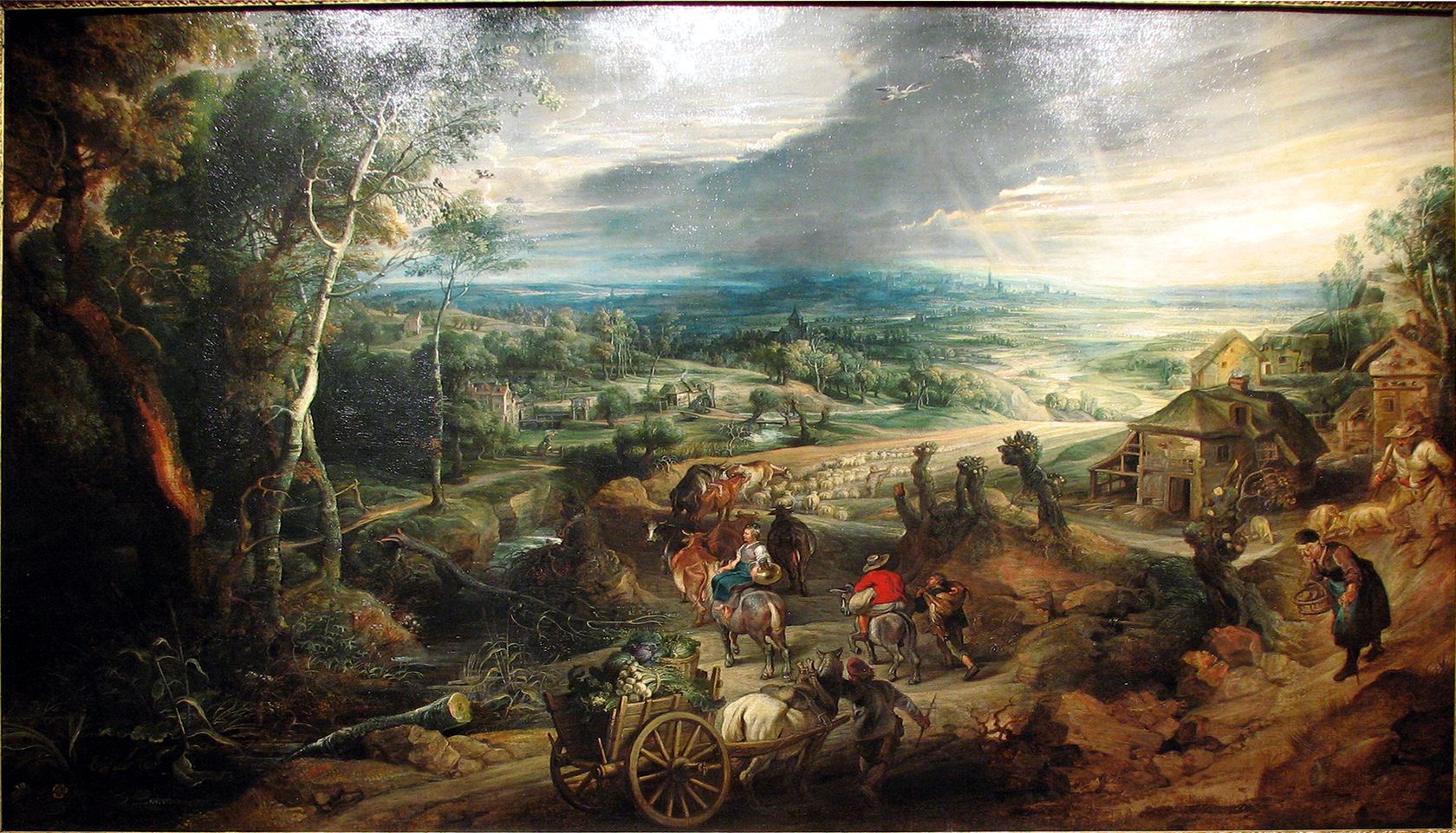Recently on this site Zephram Foster ably narrated his journey from doctrinaire libertarian to a more modest, communally minded libertarianism. Foster seems to have kept his dedication to limited government while recognizing that certain philosophical underpinnings to a thoroughgoing libertarianism leave him cold. In particular, libertarianism’s often crude individualism clashes with Foster’s professed Christianity.
Zephram Foster is not alone in this journey. One suspects that many have taken the road from some kind of libertarianism or small-government Reaganism to a more nuanced view of the role of government. One needn’t go so far as denouncing “zombie Reaganism” or rejecting a “dead consensus” to think that maybe what we need in the twenty-first century is something besides “cut taxes,” “we have too much regulation,” and “you can spend your money better than the government can.” Whatever is true about those statements—and there is truth in them—it is clear that rhetorically, and likely in actual policy, people are less interested in what government cannot do. One needn’t become an old-school New England Puritan or a Social Gospel progressive to think that in a day of obviously decaying social fabric maybe government, even the federal government, should have some role to play in mending our fraying polity.
For example, perhaps there is some alternative economic vision beyond the options of bureaucratic welfare statism (or even outright socialism) and unfettered capitalism. One of these options that is popular on the Porch but often neglected elsewhere is that of distributism. This economic theory, tied to but not dependent on Catholic Social Thought, holds that the ideal economic state is when the ownership of property, particularly productive property, is distributed (thus the moniker “distributism”) as broadly, as democratically, as possible. To put it succinctly, a distributist state is one of maximum entrepreneurship, where it is easy for individuals to own their own business and work for themselves. This, say the distributists, is the mark of a truly free economy (thus the title of John Médaille’s fine work on distributism, Toward a Truly Free Market).
The knock against the distributists is that their economic theory is unrealistic. Folks accuse distributists of having a fanciful notion of how economies work, joking that the only example of actual distributism anyone can come up with is Tolkien’s Shire. If the only example that describes your economics is a fantasy land filled with hobbits, perhaps your economic theory is lacking. While I think this criticism is unfair, I must admit there is some justice to it. I have described distributism as being as much a literary theory as a practical economic model.
Enter Alexander William Salter and his splendid recent book The Political Economy of Distributism: Property, Liberty and the Common Good. It must be said that distributism’s main proponents historically have been of a more literary and theological bent, such as Hilaire Belloc, G.K. Chesterton, and various popes. Salter brings to the table the perspective of a hardnosed, academic economist. Associate Professor of Economics at Texas Tech University, Salter is clearly well-versed in the language and techniques of academic economics. Salter makes it clear from the beginning that he is not himself a pure distributist (he seems to be coming from the Austrian free-market school of economics) nor is he part of the Catholic tradition that has so influenced distributists (he identifies himself as Orthodox). These facts, however, do not detract from Salter’s description and analysis of distributism; indeed, they render his approach particularly valuable. You could say that Salter comes to his subject as a friendly critic, a kind of distributism-curious fellow traveler.
Salter early on makes a useful distinction between economics and political economics. By economics Salter means the neutral academic study regarding how incentives influence our economic lives and how various policies might influence those incentives. Economics as an academic field does not make normative judgments; it merely attempts to describe likely outcomes based on certain policy incentives. Political economics, however, takes into account many variables that academic economics does not. If academic economics is about maximizing economic efficiency and wealth, political economics is about achieving a good society, of which providing material wealth to citizens is only one of many goods. At some point the pursuit of wealth may come at the expense of higher goods such as equality and liberty. The political economist must consider all these goods as he ponders public policy. Salter’s claim is that distributism is not an economic theory per se but, rather, a theory of political economics. What Salter provides is the academic economist’s take on the virtues and vices of distributism as an economic theory.
Stemming from this economics/political economics distinction, Salter lays out two premises. His self-described “minor” premise is that distributists have often been “poor economic reasoners.” But, he quickly adds in his “major” premise, this does not “invalidate their most important argument: societies cannot remain politically free unless they are economically secure and independent.” In Salter’s discussion of “common good capitalism,” of which distributism is a subset (and which I considered at FPR here), Salter notes that we “typically judge economic outcomes in terms of efficiency and distribution.” “Common-good capitalists” add a consideration of “the rights and duties that flow from human dignity” to this discussion. An economy that maximizes wealth while violating human dignity is not a just economic order.
As distributism is highly influenced by Catholic Social Thought (CST), Salter helpfully provides a short overview of that body of thought. Salter correctly notes that CST arose in response to rapid industrialization. No longer did the typical laborer work his own land or in her own home. Industrialization supplanted many of these “cottage industries,” leaving most people with only one option, to work for a wage for someone else. This set up different power dynamics and new questions regarding economic justice that did not exist in, say, the Middle Ages. Part of what CST contributes to these matters is the notion that sometimes individual goods must be subordinate to a common good. For example, a businessman’s sole goal ought not to be the maximization of profit (an individual good). My profit is not just if, say, I am making money by selling socially destructive goods (pornography or drugs are obvious contemporary examples). Exchanges that offend dignity might be prohibited (e.g., prostitution or exploitation of someone’s ignorance), as well as economic activity that does not respect God’s creation (e.g. strip mining or unfettered deforestation).
Salter then turns to describing the political economy of the two most notable distributists, early twentieth-century English Catholics Hilaire Belloc and G.K. Chesterton. Beginning with Belloc, Salter notes that Belloc had an “idiosyncratic” definition of capitalism. For Belloc, capitalism definitionally meant ownership of productive property in relatively few private hands. This is distinct from socialism, which constitutes ownership of productive property by the state or under such heavy regulation that property is effectively controlled by the state. What Belloc contends, though, is that capitalism and free markets are not the same thing (again, note the title of John Médaille’s book). Belloc (as described by Salter) argues that during the early Middle Ages, peasants slowly gained some ownership rights in land, differentiating themselves from slaves and serfs. A body of law arose that protected peasants’ property rights. For Belloc, the English Reformation was the turning point. The state confiscated the land of the realm’s largest property holder, the Church, and over time redistributed that land to the rich and powerful, whom the state needed to reward or bribe as circumstances warranted. Eventually land ownership centralized into the large estates that we typically think of when pondering English aristocracy (as shown in, for instance, Downton Abbey). The property laws that once protected peasants now protected the elite. When industrialism came to England, it was these wealthy landowners who could best take advantage. Thus, the rise of English industrial capitalism, which supplanted the “well distributed” property system of the early Middle Ages.
Belloc advocated various methods to combat economic centralization, such as different tax structures to disincentivize what we’d now call chain stores. The larger one’s operation becomes, the higher tax one pays. There is effectively a penalty on bigness. Belloc wishes to turn our attention from thinking in terms of consumption (“what can I buy?”), which is the attitude of the “wage slave,” to liberty (“am I economically independent?”). Economic liberty is only achieved by ownership of productive property. Belloc would likely look at modern economies and conclude, despite our vast wealth and access to truly stupendous consumer goods, that we are not really free since most of us are wage earners, not entrepreneurs or proprietors. Belloc is constantly attentive to the problems of centralization. Note in our day, as in Belloc’s, the ability of wealth to use its power to curry favor with government, secure regulatory capture, and set up barriers to entry that discourage competition.
Salter’s depiction of Chesterton is harder to summarize, as that famously enigmatic and paradoxical thinker leaves even Salter bewildered at times. The dominant Chestertonian theme that Salter chooses to emphasize is Chesterton’s defense of the household as the central unit of any republic. To the extent, then, that economics is abstracted from the family and the home, it is likely a bad economics. Just as a plant needs good soil to thrive, so does a people. For Chesterton that good soil is the independent household. Similar to Patrick Deneen in his recent book, Chesterton calls on the powers that be to defend tradition as a good that protects that common family. Salter quotes Chesterton arguing, “Democracy tells us not to neglect a good man’s opinion, even if he is our groom; tradition asks us not to neglect a good man’s opinion, even if he is our father, I, at any rate, cannot separate the two ideas of democracy and tradition.” For Chesterton, capitalism inherently creates a proletariat, a mass of unpropertied laborers who though nominally free politically, do not have the conditions of actual independence. The household becomes dependent, poisoning the soil of the republic.
At the end of each of these sections, economist Salter provides a critique of both thinkers from an academic economist’s point of view. He is critical, for instance, of Belloc’s defense of the medieval guild system. While Belloc depicts the guilds as protectors of small producers, Salter notes that guilds are often barriers to competition, much as modern licensing law is used to protect hair stylists or interior decorators from competition. Overall, Salter applies price theory to Belloc and Chesterton, arguing that they are insufficiently attentive to the way price works to distill large amounts of information into a useful tool for the average person. Price lets us know what items are worth and helps avoid inefficiency. While some of Salter’s discussion here is “inside baseball” for economists, what he is trying to achieve is laudable, namely getting distributists to recognize some shortcomings in their theory while encouraging economists to take distributism more seriously as a way of pursuing vital economic and social goods.
Salter concludes with a presentation of the thought of German economist Wilhelm Röpke. Salter offers Röpke as a middle ground between distributism and free-market absolutism. Röpke, like the distributists, believed property ownership was “the cornerstone of the humane economy.” Röpke was himself a devotee of the Austrian free-market school but believed that a good society must go beyond liberal, free-market economics to achieve a truly just society. Röpke argues, “When not abandoning themselves to mass intoxication, people know after all very well what is healthy and what is unhealthy, what is strong and what is decadent, what is just and what is unjust, what is legitimate and what is against the law, what is keeping with the nature of man and what is not.” Röpke does seem to argue, though, that this knowledge cannot be supplied simply by liberalism or free-market ideology. These philosophies have their virtues, but they are insufficient to give society all it needs to be truly just. Once we conclude that material comfort is the primary societal good, we have started on the road to perdition.
Röpke distances himself from the distributists in that he is even more skeptical of central planning than they are. He believes in “multiple independent centers of social decision-making.” In a Wendell Berry-like moment, Röpke defends family farms as good in and of themselves, having all the virtues of sole proprietorship, while counter-balancing “the industrial and urban aspects of our civilization with tradition and conservatism.” Still, Röpke is against barriers to entry, whether Belloc’s guilds or excessive regulation. He worries that too much redistribution of wealth via a welfare state will ultimately sap productivity. Like a classical Austrian economist, Röpke uses price theory to explain the ways in which government action distorts markets, causing as many problems as it solves. But he does side with the distributists against academic economists to this extent: Röpke agrees that “maximizing utiles” is insufficient political economics. He is concerned that we struggle to distinguish between what we want and what is good. The intervention of something other than strict economic theory must inform our political economics. While economists can tell us how to get what we want, they are ill-equipped to tell us how to get what is good.
I cannot recommend Salter’s book highly enough. He writes in a straightforward, readable style. While a few sections discussing economic theory swerve into jargon, the book as a whole is very accessible. Salter has made two important contributions, I believe. First, he reminds distributists that there are economic principles that must be taken into account. Distributists must be honest and admit (as Belloc did at times) that adopting distributist-flavored policies will likely make a society poorer. The goal of distributisim is not maximum wealth creation. It is sufficient wealth creation that flows from a more genuinely free political and economic order. Many people, myself included, are willing to make this exchange. We live this out when we pay more to go to the locally owned shop or local craftsman instead of buying more cheaply from the aforementioned chain store. But this is a big ask for society. We should not make that offer lightly.
Second, Salter helpfully encourages his fellow economists to give distributism some serious consideration. It is not enough to snicker at the distributists, make a hobbit joke, and then move on to the glorious efficiency of globalized markets. Salter is asking economists, especially those most dedicated to free-market absolutism, to take distributism’s political economics seriously. May Alexander William Salter’s book end up in as many hands as possible. Maybe even Zephram Foster’s.
Image credit: “Peasants Going to Market” by PP Rubens via Wikimedia Commons








3 comments
Rob G
Does Salter go into the relationship between distributism and agrarianism at all? American distributists and agrarians of the pre-WWII period were quick to realize that they had much in common, and the argument could be made that in a certain sense distributism assumes agrarianism, given its emphasis on productive property.
Brian
Anything that exposes more people to Chesterton and Belloc would be great. Thank you for writing.
“Folks accuse distributists of having a fanciful notion of how economies work”
This just isn’t a serious criticism. Chesterton and Belloc in the early 20th century made the best predictions about the last century of economic development than anyone I’ve ever read. Certainly better than any “Marxist” writer ever could have done.
“joking that the only example of actual distributism anyone can come up with is Tolkien’s Shire”
Who’s “anyone”? They give lots of examples from pre-Industrial Revolution England, but of course they were writing for an English audience, and they were pointing to real historical facts, not fantasy novels. And they weren’t proposing to literally return exactly to that same system.
“The goal of distributisim is not maximum wealth creation. It is sufficient wealth creation that flows from a more genuinely free political and economic order. Many people, myself included, are willing to make this exchange.”
Well, given that our government now openly advocates for obliterating massive amounts of wealth in order to “save the planet” I don’t see why anyone should be apologetic about sacrificing some wealth (for who, exactly?) for the common good…
Martin
Brian, given that your tongue is probably in cheek (and/or eyes rolling) in the last paragraph, I still feel compelled to emphasize a segment of the sentence you quoted: “a more genuinely free political and economic order” — I don’t see this happening in the rush to cater to the “planet is in peril” panic mongers.
Comments are closed.